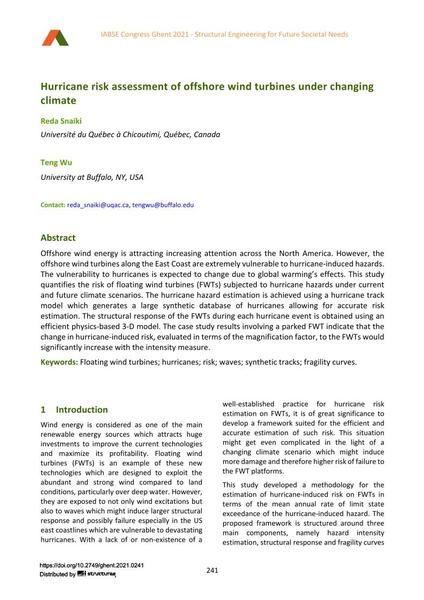Hurricane risk assessment of offshore wind turbines under changing climate

|
|
|||||||||||
Bibliographic Details
| Author(s): |
Reda Snaiki
(Université du Québec à Chicoutimi, Québec, Canada)
Teng Wu (University at Buffalo, NY, USA) |
||||
|---|---|---|---|---|---|
| Medium: | conference paper | ||||
| Language(s): | English | ||||
| Conference: | IABSE Congress: Structural Engineering for Future Societal Needs, Ghent, Belgium, 22-24 September 2021 | ||||
| Published in: | IABSE Congress Ghent 2021 | ||||
|
|||||
| Page(s): | 241-248 | ||||
| Total no. of pages: | 8 | ||||
| DOI: | 10.2749/ghent.2021.0241 | ||||
| Abstract: |
Offshore wind energy is attracting increasing attention across the North America. However, the offshore wind turbines along the East Coast are extremely vulnerable to hurricane-induced hazards. The vulnerability to hurricanes is expected to change due to global warming’s effects. This study quantifies the risk of floating wind turbines (FWTs) subjected to hurricane hazards under current and future climate scenarios. The hurricane hazard estimation is achieved using a hurricane track model which generates a large synthetic database of hurricanes allowing for accurate risk estimation. The structural response of the FWTs during each hurricane event is obtained using an efficient physics-based 3-D model. The case study results involving a parked FWT indicate that the change in hurricane-induced risk, evaluated in terms of the magnification factor, to the FWTs would significantly increase with the intensity measure. |
||||
| Keywords: |
risk fragility curves Floating wind turbines hurricanes waves synthetic tracks
|
||||
| Copyright: | © 2021 International Association for Bridge and Structural Engineering (IABSE) | ||||
| License: | This creative work is copyrighted material and may not be used without explicit approval by the author and/or copyright owner. |
||||
